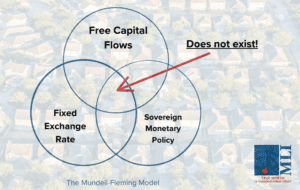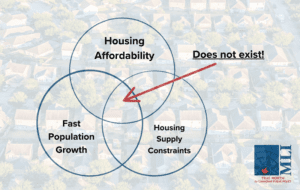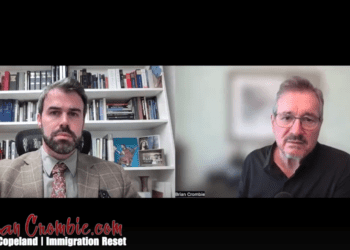By Steve Lafleur and Josef Filipowicz
It’s tempting to try to have it all and policymakers are not immune to this. There are tradeoffs in everything. Ignoring those tradeoffs might work for awhile, but eventually reality catches up to you. Try as we might, we can’t have it all.
For instance, we can’t have rapid population growth, housing supply constraints, and housing affordability all at the same time. We’ll call this the housing affordability trilemma.
The idea of a policy trilemma comes from the Mundell-Fleming model which is included in most introductory economics textbooks. The model was named after Canadian economist Robert Mundell and British economist Marcus Fleming, who developed the idea in the early 1960s. The basic premise of the model, also called the “impossible trinity” or “trilemma” is that you can have two of three policies, but not all three (namely, free capital flow, a fixed exchange rate, and a sovereign monetary policy).
The idea of an impossible trinity can and has been applied to other situations, like the euro crisis in the early 2010s, and provides a useful way of looking at seemingly intractable problems. Plotting the related problems on a Venn Diagram helps visualize the problem. Here is the Mundell-Flemming model, visualized.

(Source: Author’s creation, graphic recreated)
Now, let’s return to housing policy. Few Canadian problems are as intractable as the now nationwide housing affordability crisis. Rents are rising quickly, apartment availability is falling, and home prices are the highest relative to incomes in the G7. As we’ve shown in a recent paper for the MacDonald Laurier Institute, Canada’s population growth is outstripping housing growth. This, unsurprisingly, has undermined housing affordability. Let’s visualize this trilemma.

(Source: Author’s creation, graphic recreated)
At the root of Canada’s housing woes is a severe shortage of homes relative to the number needed. We simply don’t build enough homes to adequately house current and future Canadians.
Not only is there cross-party consensus that there’s a housing shortage, but most parties in provincial and federal elections have proposed policies aimed at addressing it. So why do we still have a shortage?
Let’s go through the elements of the Canada’s housing trilemma (or housing impossibility trinity).
The first element is a fast-growing population. Canada has the fastest growing population in the G7, and last year alone grew by more than a million people. Barring any major shifts in immigration policy, this trend is unlikely to change any time soon. Indeed, the population grew by 430,635 in the third quarter of 2023. That’s the highest quarterly growth rate since 1957.
The second element is restrictions on homebuilding. Whether intended or not, a suite of policies processes and regulations that prevent or limit the addition of more homes both in existing neighbourhoods and at the urban fringe. Barriers to density include local zoning bylaws, lengthy and uncertain consultation processes, and growth plans that exclude building or upgrading the infrastructure necessary to enable more homebuilding in existing neighbourhoods. Policies explicitly preventing the addition of homes outside of existing neighbourhoods include Ontario’s Greenbelt and British Columbia’s Agricultural Land Reserve, while softer versions include local planning targets limiting the share of development slotted to occur on city outskirts. Given these limitations, it’s no surprise that we’ve rarely surpassed 200,000 housing completions annually since the 1970s, while the rate of population growth has reached generational highs.
The third element is housing affordability. That is, the ability for individuals and families earning local incomes to comfortably meet their housing needs. This means shelter costs don’t prevent them from feeding and clothing themselves, but also allow saving and investing in an education, for instance. For example, some peg the cut-off for affordability at 30 percent of income. By that measure, a household would require an income of over $100,000 to afford a one-bedroom apartment in Vancouver, for example.
Whether we like it or not, we can’t have fast population growth, rigid housing supply constraints, and housing affordability all at the same time.
For most of our recent past, the choice we’ve collectively made is to accelerate population growth while maintaining many (if not most) restrictions on both outward and upward growth, meaning we’ve excluded the possibility of achieving broad affordability. The consequences? All the symptoms mentioned before: rising rents, falling vacancies, higher ownership costs.
Despite recent pivots by a growing number of local and provincial governments, the balance of housing and land-use policies remains firmly tilted against reaching the level of homebuilding we need to restore some semblance of affordability, which by some estimates means more than doubling homebuilding. To wit, housing construction has remained remarkably stagnant—even slightly declining—in recent decades. Even the bold changes to zoning recently passed in British Columbia, Ontario and Nova Scotia are unlikely to double the number of housing built provincewide.
But, as the housing trilemma suggests, there are alternative routes. If Canadians remain adamant about affordability, we can demand more meaningful reduction or removal of policies preventing a growth in housing supply, or we can demand a reduction in population growth, or both. These are not easy choices but ignoring them doesn’t make them go away. We need to build upwards, outwards, or both, in order to meaningfully increase housing production. We can’t say no to every solution and expect better results.
The point is, there’s broad consensus that Canada faces a housing crisis, and that major policy actions are needed to fix the problem. There’s also a tacit consensus that the policies feeding the crisis should remain in place.
To put it more bluntly, everyone wants to solve the housing crisis, but no one wants to solve the housing crisis enough to make the hard choices. Until we collectively shift our priorities, we are choosing to sacrifice housing affordability. We can’t have it all. If we insist on maintaining fast population growth and restrictions on supply, we’ll get the broken housing market we deserve.
Steve Lafleur is a public policy analyst who researches and writes for Canadian think tanks.
Josef Filipowicz is an independent policy specialist focusing on urban land-use issues including housing affordability, taxation and municipal finance.






